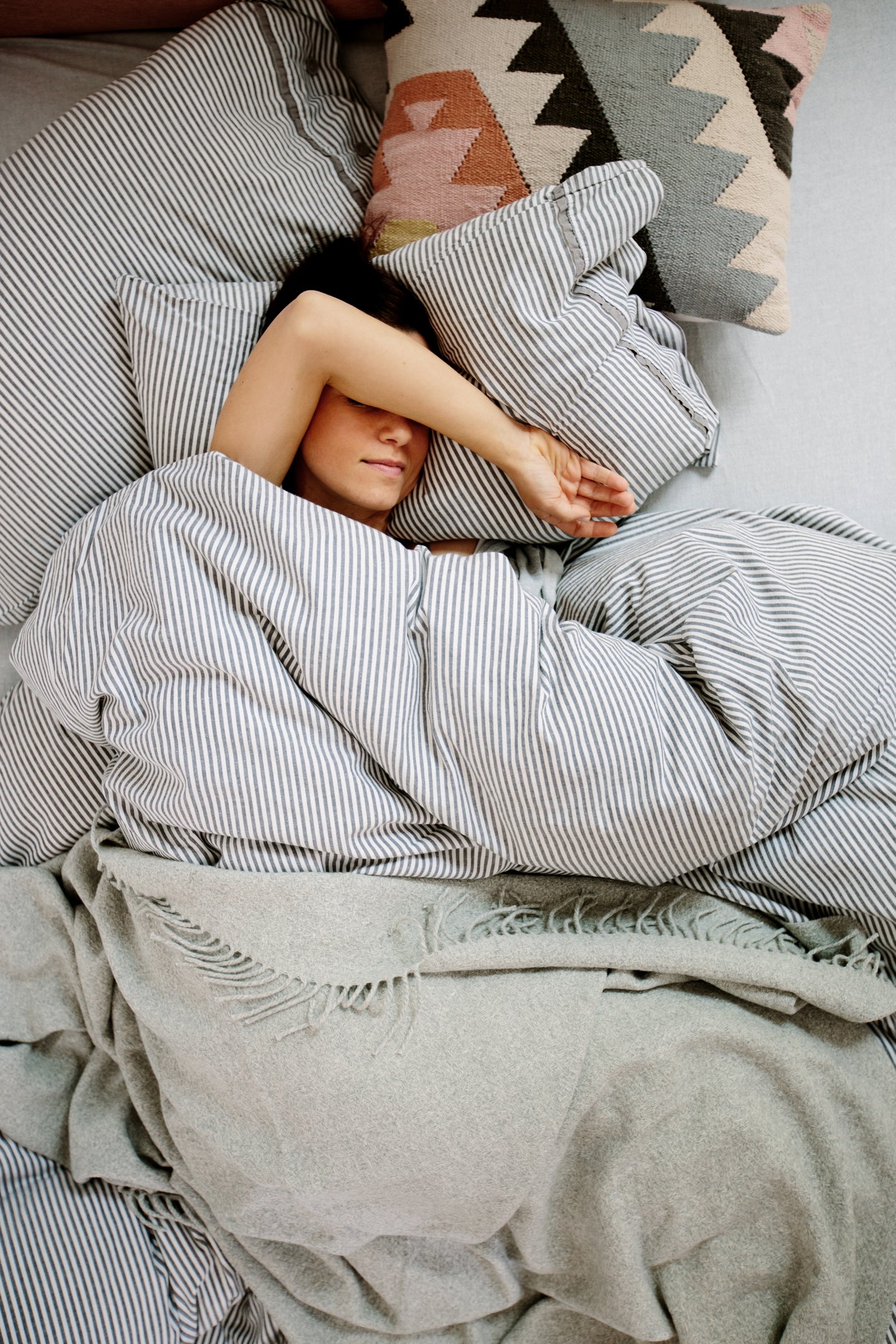I Tried 6 Nightly Rituals to Help With My Anxiety—This Is What Actually Helped
Stress no more.
Updated Oct 11, 2018 3:14 PM
We may earn revenue from the products available on this page and participate in affiliate programs.
Develop a nighttime routine to help with my anxiety was never on my to-do list. Normally, I’d fall asleep the minute my head would hit the pillow and only experience high amounts of stress during the day. Lately, though, it’s felt like my mind is in overdrive. I started to notice that it became harder to wind down and stay asleep at the end of each night. So before things got worse, I decided to do something about it.
To combat these stressful evenings, I decided to incorporate different nightly rituals that have the potential to ease my anxiety in some form or fashion. While meditation and a bath would normally be high on my list, these were things I was already doing and, unfortunately, stopped being effective on their own. After a bit of combing through the internet, I found a few unique tricks and scheduled to do each one for six consecutive nights. And even though most of them helped, there was one ritual that made all the difference. Below, here are all the tricks I tried.
Do Some Nighttime Yoga
I try to do yoga at least once a week. It allows me to get out of the house and focus on something other than work. However, I usually go to yoga class in the morning or midafternoon for a quick pick-me-up; it was foreign for me to do a yoga routine right before I went to bed, especially when I thought it would keep me up.
According to LIVESTRONG, doing yoga at night can actually help you wind down and get your mind ready to relax, especially if it includes light stretches, forward folds, and twists. And after experiencing high anxiety, I decided to end the workday early by finding a yoga class on YouTube that would incorporate all these elements. Luckily, I already had one in mind.
Yoga with Adriene is my usual go-to, so I searched for an easy wind-down session that would help me chill out. I lit a few candles and turned off the lights, and then started the routine. After 20 minutes, I felt like a new person. While I still had residual anxious feelings, it felt amazing to stretch my body. Once the workout was over, I laid on my mat for an extra 10 minutes to meditate, and for the rest of the night, I felt completely zen. I highly recommend doing this ritual at night when your anxiety is extremely high.
Tidy Up
I’m never able to relax when I go to sleep in a messy room. Stumbling over dirty clothes always reminds me that my life is a little out of order, and I have another thing to add to my to-do list. But cleaning my room is not something I look forward to doing—especially right before I go to bed. Unfortunately, I knew that my messy room wasn’t helping with my anxiety, and I needed to do something about it, pronto.
About 45 minutes before I went to bed, I went around the room and picked up everything off the floor. I folded my clothes the Marie Kondo way and threw away anything that belonged in the trash. While I didn’t have the time to do a deep clean, walking across the floor with ease made me feel 100 percent better.
But what’s the deal with messy rooms causing stress anyways? Well, licensed clinical psychologist, Sarah Schewitz, Psy.D., explains that the clutter in your room can create a cluttering effect in your mind. “The way your room looks definitely impacts anxiety. Clutter around the house or in your bedroom serves as a constant reminder of the ways you are falling behind,” she says. “I would recommend making your bedroom feel like a sanctuary. Hang soothing artwork or photos, run a diffuser with lavender oil and chamomile before bed, and if you’re into crystals, there are many that have soothing properties that are great for the bedroom.”
Get Journaling
I’ve been journaling for as long as I can remember. Over the years, it’s become a therapeutic practice that enables me to hash out big problems or remember positive moments that have been going on in my life. But, to be honest, journaling can take up a lot of time when I really want to get into it. So when I learned that simply writing down your day’s successes is a quick and easy way to ease anxiety and focus on the positive, I was all in.
“Writing a list of wins at the end of the day is a great technique for managing anxiety. This is so helpful because it overrides your brain’s natural tendency to look for danger and negativity and instead, encourages you to focus on the positive, which can decrease anxiety,” says Schewitz. “Your brain has a mechanism called the reticular activating system (RAS), which is in charge of filtering out anything irrelevant in your environment so that you only focus on the important things. Most of the time, the RAS is looking for what’s wrong or dangerous about a situation, and this is heightened in someone who has anxiety so their worldview becomes increasingly negative.”
Right before I went to bed, I tried to remember three to five things that I would consider wins. Anything from “going outside” to “completing an assignment” would go on the list. After a little while, it slowly became easier for more positive moments to pop into my head. This ritual is perfect for someone who is experiencing a tough time. While anxiety can be triggered by worrying about the future or the past, writing down your wins—no matter how small—from the day allows you to be present.
Try a Little Facial Massage
If there’s one thing I—and many, many others—aim to do every night, it’s a skincare routine. The idea of layering beauty products on your face at the end of the day can be soothing in its own right. However, I decided to take things a step further by including a facial massage into the mix to induce that relaxed feeling some people get after a facial or full-body massage.
This required me to schedule extra time for my skincare routine; I didn’t want to rush the process. The User Science Institute indicates that facial massages decrease anxiety and improve your negative mood. While it mentions doing this for 45 minutes, I aimed to do a 15- to 20-minute massage because it ended up being a busy workday.
Around 8 pm, I decided to begin my skincare routine by standing in front of my mirror, like I normally do. After layering all my beauty products onto my face, I gently rolled my amethyst roller over my skin in slow, rhythmic motions while I meditated. It kind of worked in the beginning, but I felt like something was missing and soon realized this would work best if I was lying down. So I went to bed and repeated the motions over my face as I focused on my breath.
I felt quite sleepy and relaxed afterward and probably would have felt the full effects if I did it for the recommended 45 minutes. While it didn’t completely cure my anxiety, I can definitely see myself including this step along with one of the other nightly rituals for an added relaxing effect.
Eat Anxiety-Reducing Foods
Here’s a food for thought: spinach, dark chocolate, avocado, and chamomile tea are all known to help with anxiety. Incorporating these foods into your diet can ease your stress hormone (cortisol) and regulate your nervous system, according to Nutritionist and Founder of NAO Nutrition, Nikki Ostrower. This comes, of course, with a few stipulations: You should be mindful of the kind of chocolate you consume. “Not all chocolate is created equal. Aim for 75 percent dark chocolate and above,” says Ostrower.
Spinach, on the other hand, is known to provide 40 percent of your daily recommended dose of magnesium. “Magnesium has over 300 biochemical reactions in the body. One is nervous system regulation, which helps to regulate our neurotransmitters and eases anxiety,” she continues. With this information, I decided to include all these foods into my nighttime routine. While I wasn’t expecting a total cure, I was hoping for them to reduce my nervous energy.
At 8 pm, I made a chicken, spinach, and rice dish and added slices of avocado on the side (which contributes to better blood flow to your brain to help release anxious thought patterns). After 30 minutes, I still felt a little anxious, so I decided to have a piece of chocolate that was 75 percent dark and ended the night with a stress-reducing chamomile tea. By 10 pm, my anxiety wasn’t completely gone, but the healthy meal didn’t add any negative effects, which a heavy, fried dish would’ve most likely done. I woke up the next day feeling good but not great. Sure, the food helped a little, but I had a residual hangover from looking at a screen all day from the day prior, which easily led me into my final ritual.
The Winner: Swipe Left on Screen Time
Looking at your phone right before you hit the hay is considered a big no-no for plenty of reasons, and it was something that I would do nightly. Sometimes when I couldn’t go to bed, I would scroll on social media for an hour or two until my eyelids started to get sleepy. Healthy? 100 percent not. But it was a longtime habit that I wasn’t planning on breaking anytime soon until now, and the only way I knew how was by putting my phone in another room for the rest of the night.
This time I decided to go to bed around 9 pm because I was feeling pretty exhausted. I placed my phone on the coffee table and went to the bedroom to watch TV with my fiancé. Knowing that the phone wasn’t near me for the remainder of the night was such an eye-opener. I felt at ease, which was a complete shock. As if not having the phone on my nightstand reminded me what it felt like to be completely disconnected. I realized that I would not only use my phone to help get rid of my anxious thoughts but also to completely ignore them.
“There also is evidence to support that looking at screens that produce blue light right before bed makes it more difficult to sleep. It’s important to get a good night’s sleep to help manage anxiety, so anything that interferes with your sleep will likely only increase your anxiety,” Schewitz explains.
However, if the idea of sleeping in a separate room from your phone scares you, there’s another way you could use social media as a tool to provide positive thoughts. “Scrolling through Instagram can have positive or negative effects depending on who you follow and how you interpret the posts you see. If you only follow motivational accounts with positive quotes and inspiring content, scrolling through Instagram will probably reduce your anxiety and instill hope,” she says.
I woke up the next day feeling amazing. I went to bed pretty quickly because my phone wasn’t there and I loved the idea of starting my day without automatically scrolling through my social media accounts. This was a revelation, and I plan to continue to do this ritual moving forward.
See more wellness: 6 Ways I Restyled My Home to Soothe Anxiety What Actually Happens to Your Body When You Meditate These Supplements Are Guaranteed to Improve Your Mood






